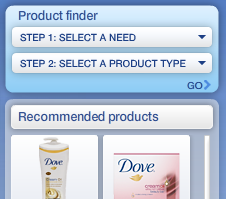Less Cause, More Marketing for Unilever
Submitted by Diane Farsetta on
 In 2004, the Unilever company Dove got lots of attention for using "ordinary-looking -- in some cases heavyset -- women in its ads for shampoos and beauty products.
In 2004, the Unilever company Dove got lots of attention for using "ordinary-looking -- in some cases heavyset -- women in its ads for shampoos and beauty products.

Submitted by Diane Farsetta on
 In 2004, the Unilever company Dove got lots of attention for using "ordinary-looking -- in some cases heavyset -- women in its ads for shampoos and beauty products.
In 2004, the Unilever company Dove got lots of attention for using "ordinary-looking -- in some cases heavyset -- women in its ads for shampoos and beauty products.
 Junk mail kills trees, clogs mailboxes, packs landfills, wastes natural resources, and everyone would be glad to be rid of it. Right?
Junk mail kills trees, clogs mailboxes, packs landfills, wastes natural resources, and everyone would be glad to be rid of it. Right?
Well, maybe not.
Whether out of environmental concern or sheer annoyance, legislated efforts to reduce junk mail are on the rise, but companies that have vested interests in its continuance have started organizing to save it--in a big way. Of course, they don't call it junk mail. Their preferred euphemisms are "advertising mail," "direct mail" or even "standard mail."
Submitted by Sheldon Rampton on
For Mark Penn, who recently resigned as Hillary Clinton's chief campaign strategist, the campaign "has been about as effective an economic stimulus program for himself as anything his clients have ever proposed for the nation," reports Mike Madden.
 The Second Circuit of the United States Court of Appeals missed a great opportunity this week to hold the tobacco industry accountable for one of its worst marketing tactics -- positioning cigarette brands in response to smokers' medical concerns. The April 7, 2008, issue of the New York Times has an article about the dismissal of a huge, class-action lawsuit against the tobacco industry that was brought by smokers of "light" cigarettes who claimed they were misled about the relative safety of "light" cigarettes compared to regular, "full flavor" cigarettes. The suit, and its dismissal by the court, brought to mind a little-recognized tobacco industry marketing survival tactic that weighs heavily on the public's perception of exactly what "light" means.
The Second Circuit of the United States Court of Appeals missed a great opportunity this week to hold the tobacco industry accountable for one of its worst marketing tactics -- positioning cigarette brands in response to smokers' medical concerns. The April 7, 2008, issue of the New York Times has an article about the dismissal of a huge, class-action lawsuit against the tobacco industry that was brought by smokers of "light" cigarettes who claimed they were misled about the relative safety of "light" cigarettes compared to regular, "full flavor" cigarettes. The suit, and its dismissal by the court, brought to mind a little-recognized tobacco industry marketing survival tactic that weighs heavily on the public's perception of exactly what "light" means.
The tobacco industry has long had a remarkable ability to rescue itself from damaging health claims by turning allegations against its products into marketing opportunities. Inside the industry, the fact that cigarettes cause widespread illness and death is referred to as the "smoking and health" issue, or "S&H issue" for short. Tobacco marketers consider "S&H issues" to be little more than "external marketing forces" that require re-positioning of products, through changes in advertising copy strategy, so that smokers will get an illusion of safety from the dangers they perceive.
Submitted by Anne Landman on
 A rock cocaine cigarette filter? A cigarette that delivers birth control and sexual stimulant drugs to the smoker at the same time? A geriatric brand? All of these are actual ideas for new products and promotions that were recorded at cigarette company "brainstorming" meetings.
A rock cocaine cigarette filter? A cigarette that delivers birth control and sexual stimulant drugs to the smoker at the same time? A geriatric brand? All of these are actual ideas for new products and promotions that were recorded at cigarette company "brainstorming" meetings.
Submitted by Diane Farsetta on
Submitted by Judith Siers-Poisson on
Submitted by John Stauber on
The latest green marketing study from Nielsen Online "calls greenwashing a 'failed corporate strategy' and urges brands to aim for transparency and consistency instead.
Submitted by Bob Burton on
The giant of the fake news business, Medialink Worldwide, has fallen out of favor with investors. In the last year the company's share price has plummeted from $5.81 to its current level around the $1.70 mark. In its latest annual report, the company glumly states that sales in 2007 in the U.S.
Submitted by Bob Burton on
Medicines Australia (MA), the peak drug industry lobby group, has unveiled details of how much its 42 member companies (and one non-member) spent in the last half of 2007 on each one of over 14,000 events that were designed to promote their drugs to doctors.
Center for Media and Democracy (CMD)
520 University Ave, Ste 305 • Madison, WI 53703 • (608) 260-9713
CMD is a 501(c)(3) tax-exempt non-profit.
© 1993-2025